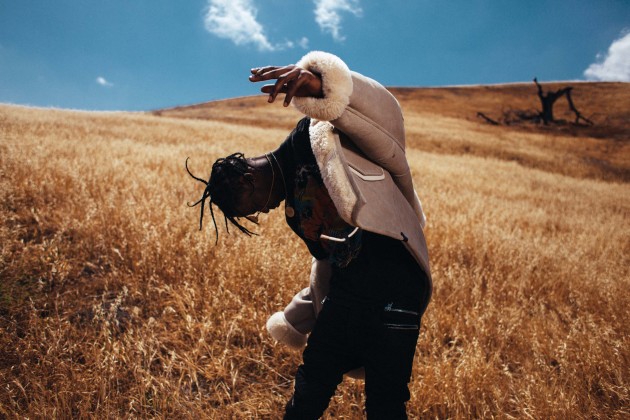Since the release of his breakout debut mixtape, Owl Pharaoh, in 2013, Travis Scott has cemented himself as being synonymous with incredibly ambitious production, hard-hitting basslines, and non-stop partying. The critical success of his 2013 project was followed by the more refined mixtape, Days Before Rodeo, and Scott’s first studio album, Rodeo. Both projects demonstrated a deeper understanding of production and instrumentation, as well as Scott’s unbounded creativity. His latest album, Birds in the Trap Sing McKnight, strays from his usual sound, however, offering an ethereal and relaxing listening experience. While Birds does not immediately strike listeners as revolutionary, it marks a welcome evolution in Scott’s career, as he dials back his ambition in order to craft an album that is controlled, well-paced, and easy to listen to.
Whereas Rodeo was suited for the end-of-year Frat party blowout, with a lineup that featured bangers such as “3500” and “Antidote,” Birds is tailored for a much more intimate setting. The basslines are more tamed, the experimentation is more subtle, and the tempo is slower than any of Scott’s previous ventures. , “Lose,” which can be hardly defined as a rap song, save its use of synthetic beats and sampling exemplifies this more relaxed attitude. On this track, Scott delivers smooth, autotuned vocals over a tranquil beat. Fans of Scott’s previous work may be left desiring more, but this slower pace is what makes Birds all the more interesting.
This slower, ethereal, and, at times, minimalistic approach defines Birds as a whole. Each song seems as though it is missing a layer of instrumentation or bass that was present on Scott’s previous album. Many will say this demonstrates a regression in Scott’s creative vision and artistic ability, but it may show more progress than immediately meets the eye. Unlike Rodeo, which is best served on a single by single basis, Scott has crafted a studio album that is connected by a definite theme throughout. Even if this theme is minimalism and a more relaxed vibe, Birds certainly benefits from having a defined sense of direction.
It is no secret that Scott’s strengths lie in production and his creative vision, not in rapping. To combat this criticism, Scott once again employs numerous guest verses. Bryson Tiller (“first take”), Kendrick Lamar (“goosebumps”), Kid Cudi (“through the late night”), and Young Thug (“pick up the phone”) all make unattributed appearances on the track list. Listeners are also treated to an exceptional verse from Andre 3000 on the opening song, “the ends,”in which 3000 raps about the 1979-1981 Atlanta Child murders perpetrated by Wayne Williams. Even performances from lesser known artists, such as K. Forest and the aforementioned Cassie serve as nice compliments to the album. Scott’s willingness to hand over much of the lyrics and vocals on Birds to his contemporaries serves to complement the album’s stellar production.
Scott does nothing, however, to distance himself from criticisms of his bland lyrical content and poor pure rapping ability. Much of the album is dedicated to Scott rapping about his lavish lifestyle or the copious amounts of drugs he requires to maintain a high. No follower of Scott would expect him to bring socially impactful or conscious lyrics to the table, and he seems to understand that his niche in the industry lies in producing consistent party-themed songs.
Perhaps the biggest disappointment with Birds is its brevity. The album contains only 14 songs, three less than Rodeo. Furthermore, two of the songs on the tracklist, “pick up the phone”’ and “wonderful,” were released several months prior to the album itself. With only 12 new tracks, there is a desire for more content, especially considering the album was delayed twice due to “technical difficulties.” The lack of an immediate chart-climbing single combined with this short runtime is puzzling. However, this concision showcases Scott’s newfound self-control when it comes to his music, making Birds more artistically appealing than any of his previous ventures.
Birds in the Trap Sing McKnight may not be the first choice when one is handed the aux chord at a party, but the album shows tremendous strides in Travis Scott’s overall understanding of production. He is able to reign in some of the overreaching ambition that plagued his previous projects and relinquishes control of much of the vocals to his peers, who deliver solid guest verses. In the end, Scott’s ability to craft a coherent album with a common theme throughout is a welcome sign in his career, even if the music is not as immediately complex as fans are used to.






